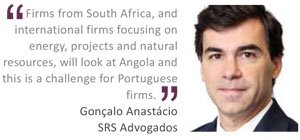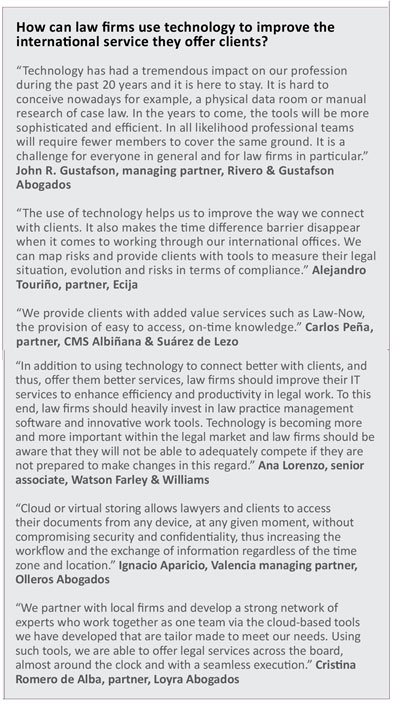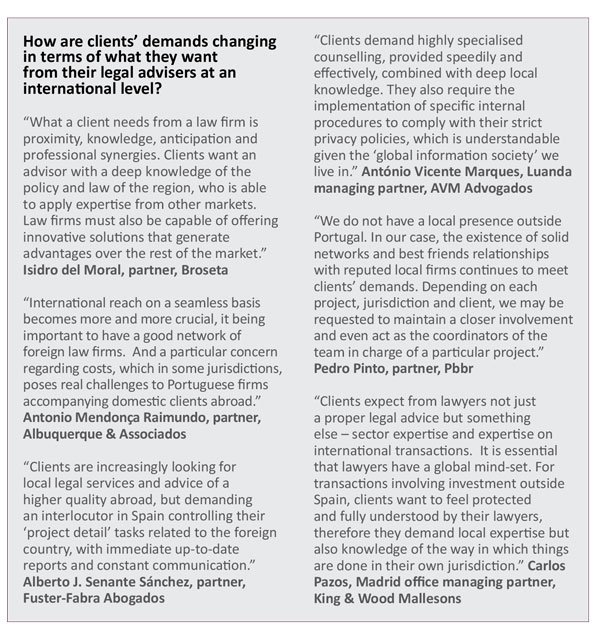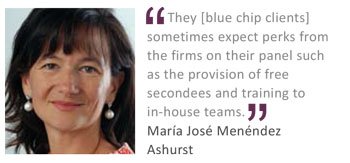Global Special Report 2015: Spicing things up
With Iberian companies increasingly looking to grow their business abroad, places like India, China and the Middle East are emerging as potential hotspots for Iaw firms in Spain and Portugal
The broad generalisation about where the best international opportunities lie for Iberian law firms generally suggests that firms in Spain look to Latin America, while those in Portugal generally focus on Lusophone Africa. Those assertions would, in the main, be accurate. However, dig a little deeper and new sources of revenue for Iberian firms are coming on stream elsewhere in the world. Spanish firms are increasingly eyeing India – despite restrictions on foreign firms opening offices there – while China and Japan are also attracting attention as Spanish companies look to expand abroad as the Spanish economy undergoes a slow, albeit steady, revival. Throw jurisdictions like Algeria and Saudi Arabia into the mix, and we see that, while Latin America still forms the bedrock of Spanish law firm’s international expansion plans, there are opportunities in other parts of the world that justify closer attention.
In a similar vein, Portuguese firms have traditionally seen Lusophone Africa as a source of considerable bounty, and this remains the case. However, opinions as to where Lisbon law firms will generate the most growth in the coming years are beginning to change. A number of Portuguese lawyers are confident that the Portuguese, rather than the African market represents the best bet in the short term. It is expected that a significant amount of the domestic growth in Portugal will be driven by Chinese investment – the law firms most able to meet the needs of such clients look set to prosper in the next few years.
 Eyes on India
Eyes on India
Maite Diez, partner at Baker & McKenzie, says there are big opportunities in Asia – namely China and Japan – and India. She continues: “There are also growing opportunities in Africa.” However, Diez says it is not always possible to open offices in the jurisdictions that are currently showing potential. “Foreign firms can´t open in India, while in Africa, you have to have relationships with local firms and lead the transaction from Europe.”
Ashurst partner María José Menéndez says her firm has an exclusive partner law firm in India because it is “not possible to operate locally”. She adds: “The main challenge is profitability and fees”. Menéndez says that the main opportunity for law firms is to accompany clients to foreign jurisdictions. “Clients appreciate the sophistication of the work and pay the fees, but setting up your own office is risky.” She adds: “Firms usually open overseas offices to accompany clients, but the more sophisticated clients often access the top local practitioners directly and are less in need of hand holding, and thus of an accompanying firm.”
Squire Patton Boggs’ Madrid managing partner Rafael Alonso says: “India is a natural market for Anglo-Saxon law firms, but you don´t yet see many Indian companies investing outbound.”
Herbert Smith Freehills partner Eduardo Soler-Tappa says one of the biggest current challenges for law firms relates to international arbitration cases, particularly in the energy and construction sectors. He adds: “There is a lot of business outside Spain, in Algeria and Saudi Arabia, for example, and we have a big opportunity to follow clients into those jurisdictions.” Soler-Tappa says that in some countries, Spanish clients only opportunity for settling disputes is via arbitration.
Pérez-Llorca partner Iván Delgado says there is considerable renewables-related litigious work for law firms, but there are also opportunities to act for Spanish clients investing in Latin America and the US. In particular, he highlights opportunities in the infrastructure, real estate, renewables and retail sectors in Brazil and Mexico.
Allen & Overy partner Íñigo del Val says that there has been an increase in outbound investment from Spain, particularly in Europe. He adds that it depends on the jurisdiction as to whether it makes sense to open an office in countries where clients move. “Opening offices in each relevant jurisdiction in South America requires lot of investment but we have an office in Brazil and we´ve opened in Morocco, Canada and South Africa successfully,” he says.
Eduardo García, partner at Clifford Chance says that a “one size fits all” approach to foreign offices is impossible. He adds: “We need to be where the major financial and regulatory centres crucial to our clients are, while a deep knowledge of the local markets where we compete with top local players remains essential to manage client expectations.”
 US-UK rivalry
US-UK rivalry
Linklaters Madrid partner Juan Barona says that legal business is a global business and that, with regard to serving clients in foreign jurisdictions, it is a case of “exporting the Anglo-Saxon system”. He adds: “There is currently a battle between US law and UK law over which is the best for restructuring companies – the advantage of the Anglo-Saxon model is the system, but the disadvantage is that it is expensive.”
Alonso says that the project management aspect of lawyers’ work has changed. “You are managing clients across the world – in the domestic market, we are reinventing ourselves – in Madrid we are connecting with the Anglo-Saxon market in Latin America,” he adds. “You manage a client’s interest in many different jurisdictions and you are accountable for it, if it goes wrong, you will be acting as a complaint desk.”
Diez says that, for law firms, “project management is key” if several jurisdictions are involved.
Del Val says the type of law used depends on the type of work. “With restructuring, finance and capital markets, it´s mostly US or UK, but in M&A, you need the local knowledge as well,” he adds. “The more countries involved, the more profitable the work is but if the deal is local only, the pressure on fees is huge.”
Lawyers say that some clients are happy for local firms to handle matters in different jurisdictions, though others are not so. Diez says: “It depends on the in-house legal team, sometimes they see the value of a legal network.” Alonso adds: “Some clients call you for everything – the problem can be convincing lawyers in other offices and jurisdictions to align their prices and hourly rates to the ones demanded by your clients.”
Menéndez says blue chip clients tend to be the most profitable, but some have “strict panel processes”. She adds: “They sometimes expect perks from the firms on their panel such as the provision of free secondees and training to in-house teams.” Diez says that there is a growing trend among large multinational companies to have law firm panels. Menéndez claims that firms on panels generally do get a share of the legal work being offered. García says: “Companies tend to have two law firm categories to manage panels more efficiently – one for highly specialised, value-added work and one for more commoditised work.”
Diez says clients want more efficiency from law firms. “Firms need to change the way they work and change their business model – clients need to reduce cost which means more routine work not done by expensive lawyers, perhaps by paralegals who are outside the partner career structure,” she says.
Joaquín Echánove, partner at DLA Piper, says management skills are becoming more important in law firms. “Firms will be working more and more with consultants in order to improve management skills,” he adds.
Staffing issues
Menéndez says the big challenge for law firms is to be properly staffed. “Workflow is difficult to predict,” she adds. “Clients will possibly not use the same firm for all types of work.”
Alonso says that for the highest value legal work, law firm leverage has been reduced. “Clients want direct contact with partners, while knowledge management is also very important,” he says. “The role of general counsel has also changed in terms of their relationships with external lawyers. Many times the general counsel takes the lead on the matter and requests the external counsel to provide only specific advice, you have to add value.”
Barona says that it is not always important for law firms to have a network of global offices to be successful as exemplified by some competitors in the market. He adds: “There are law firms with reduced networks that are doing well. We [Spain] are a significant jurisdiction, but we are one more piece in the global world – for example, Telefónica uses US firms for capital markets work although we are involved in these deals acting for the banks.”
Menéndez says there is an increase in tension between US and UK firms as the US and UK legal systems are “spreading across jurisdictions, particularly in relation to finance”. Alonso says that the Spanish legal market is exhausted: “If you´re a law firm opening in Spain, I don´t know how you will survive, if you´re a boutique, you may be okay, but if you´re not specialised, I don´t know – the more international you are, the better your chance of survival.” Meanwhile, Diez says that companies are increasing the size of their in-house teams, which are becoming more sophisticated. Delgado is positive in his outlook. “We´re seeing more business and more transactions – investors are coming more actively,” he says.
Fees still low
Echánove adds that the market indicators are “still positive, however there are certain internal political factors which may create doubts about Spanish stability”. Diez adds that investors may delay deals in Spain due to uncertainty surrounding the elections later this year. Meanwhile, she also says that many clients think that, among the top 10 firms, they will get a similar service and then they choose the legal advisers on the basis of price. Menéndez says her firm’s primary focus, internationally, is Asia and Australia with the sectors being targeted including financial institutions, technology, as well as natural resources and energy.
Barona says there is a lot of pressure on fees, though he adds that clients are “happy to pay fees for complex matters”. Diez says she has been surprised by some quotes recently given by law firms to clients: “They are still low,” she says. But Alonso adds that, with regard to fees, there has been “no reducing or freezing of rates”. He also says that it would be “great if law firms would be able to charge the same fees as consultants as we [law firms] do take significant professional liability on the matters we handle for clients ”.
García says that cybersecurity is a big issue for law firms and clients. “Clients are concerned about how we protect data,” he says. “In a highly changing global environment we need to move fast to anticipate the market and client needs – efficiency is another challenge and the use of technology in order to work smarter, more productively and in a way that facilitates and increases the impact of knowledge sharing with more flexible working models.”
Diez says that her firm is providing training to its lawyers to enable them to identify cyberattacks and that this includes mandatory online training. Delgado says that technology can make lawyers’ lives easier by allowing them to have a better work-life balance: “The expectation is that lawyers are available at all times, and technology helps greatly in this sense.” Alonso says that increasingly in pitches law firms have to show that their IT system is compliant with the client´s system. He adds: “Billing guidelines are also becoming very sophisticated to meet the clients’ demands.”
Portugal: Angola cooling down?
Uría Menéndez-Proença de Carvalho managing partner Duarte Garin says that Angola and Mozambique still offer the best opportunities for law firms abroad. He adds that “severe regulatory issues” in Brazil mean that it is market with limited potential, while Angola despite once being a hotspot is now going through some “rough times”.
Gonçalo da Cunha, partner at F. Castelo Branco, says that there is not the same level of activity in Angola as there was last year. However, AVM partner Sandro Polónio de Matos says there are still good opportunities in Angola. “We are facing permanent and new challenges even when they arise from adverse contexts – regardless of the oil crisis we see that there is a new wave of legislation in Angola triggering a new demand for legal services,” he says. “There is a new labour law as well as other, more sophisticated legislation – tax collection disputes are also increasing as well as labour restructuring.”
Antonio Villacampa, partner at Uría Menéndez-Proença de Carvalho says that, in Spain and Portugal, many clients are looking for opportunities abroad. He adds: “US and UK firms are good at this, but Portuguese firms can add value and we certainly think there are ways of adding value – for many clients, the important thing is understanding the difference in legal systems.”
Cuatrecasas, Gonçalves Pereira´s newly appointed director of Portugal Frederico Pereira Coutinho says that the main challenge for law firms in Iberia is covering international markets. He adds: “We can cover the Spanish and Portuguese-speaking world, we have experience in Mozambique – where we opened an office in 1998 – and then we opened in Brazil and have a correspondent office in Angola in response to Portuguese investment in these countries. Our international presence has given us advantages with inbound work, and also involvement in many areas from infrastructure, energy, and aviation financial services, to international arbitration and tax planning.”
Rafael Lucas Pires, partner at SLCM in Portugal, says his firm goes abroad with Portuguese clients as their “legal strategic adviser”. He adds: “We talk to foreign lawyers and add value on outbound investment, our size doesn´t justify opening foreign offices – we try to create relationships with independent firms, but it can be difficult to convince clients as they tend to go for one-stop shops.”
Abreu Advogados partner Fernando Veiga Gomes says that, with regard to the Angolan legal market, “unless you are a local player, you cannot live on referrals”. He adds: “You need to be a local player to succeed locally. At Abreu we think it is important to have Angola, Mozambique and Brazil desks in Lisbon, in order for clients to know our faces, on the other hand it´s also important to have people we trust in these countries to execute the requested tasks.”
Sérvulo & Associados managing partner Paulo Câmara says that while there have been some recent regulatory developments in Lusophone Africa, the countries are “still in the Portuguese regulatory tradition”. He adds that China is a new player in Lusophone Africa and will have a greater role in future.

Many recipes for success
ABBC partner Nuno Azevedo Neves says there is “not a single recipe” for law firms’ international strategies and that a number of factors need to be taken into account. “Firms must have a clear strategy, they have to implement it and follow it, and they can´t depend on conjuncture issues, such as the drop in oil prices, for example,” he says. “You have to have a clear strategy, to focus on how you will be adding value to clients, and you have to be able to implement your strategy.”
António Payan Martins, partner at CMS Rui Pena & Arnaut, says that the biggest opportunity for Portuguese firms to grow is in Africa. “Africa has tremendous growth potential and not only in energy, global players are now arriving in Africa – Kenya is now the biggest hub in east Africa,” he adds. “The firms able to offer global capabilities have big opportunities – there are some tremendous deals, not only inbound investment from Europe or the US but also ‘Africa-Africa’, for example Moroccan firms are investing heavily in sub-Saharan Africa.” Payan Martins says that if firms focus exclusively on Mozambique and Angola they risk missing out on the wider picture in Africa.
PLMJ partner Nuno da Cunha Barnabé says the current model for Portuguese law firms is “we can do Angola and Mozambique work from Portugal, but this will change, in future the work will be done in Angola and Mozambique”. He adds: “The model will evolve into cooperation with local partners.”
Manuel Protásio, partner at VdA, says the Lusophone market is becoming more sophisticated so there is a need for local players. “International clients are moving from thinking ‘I know you guys, I don´t care who you use’, to local lawyers taking the helm,” he says.
SRS Advogados partner Gonçalo Anastácio says international law firms are increasingly looking into potential opportunities in Africa. He adds: “Firms from South Africa, and some international firms focusing on the fields of energy, projects and natural resources, will look at Angola where fees are high and this is a challenge for Portuguese law firms.” But Anastácio says that for the foreseeable future there will still be a lot of added value offered by Portuguese firms. “For example, a competition law has been enacted in Mozambique, but they do not have competition lawyers so there will be a win-win situation for Portuguese firms and good local lawyers.”
Baker & McKenzie is understood to have recently been in talks with lawyers in the Lisbon market with a view to opening an office in the city. Payan Martins says that US firms would most likely look at Portuguese firms as a way of accessing the Lusophone Africa market. “It is possible a US firm could open in Lisbon, though it would not necessarily be a fully-fledged office in Portugal – with the strong presence of US funds in Portugal, it may make sense to follow these clients,” he says.
MLGTS partner Filipe Lowndes Marques says that, in the last year, the economies of Lusophone Africa have not grown as much as was expected. “For those firms that set up structured offices like us, it has been constant growth – and although in general all Portuguese law firms are still interested in Africa, we have seen that many are not as keen as perhaps they used to be,” he says. Da Cunha says clients want a “one-stop-shop”. Meanwhile, Câmara says: “We have a Mozambican firm we work with that is good for tax and mineral resources – clients are selecting specialist local firms.”
 China looks to Portugal
China looks to Portugal
Anastácio believes that, in Lusophone Africa, the level of competition in the legal markets is increasing: “They are becoming more challenging, and more demanding, markets.” Pires says that with regard to Lusophone Africa, most Portuguese firms “used to do the work by themselves, but have developed cooperation with local firms”. Pereira Coutinho says it is becoming increasingly important to know and understand clients’ business. “The profile of foreign investors has changed, it´s about adapting to the business culture and adapting to the local culture,” he says. Veiga Gomes says that Cape Verde is another market that offers potential, while East Timor also offers considerable opportunities. He adds: “We are focusing on energy, investment, banking and finance.”
One partner at a leading Portuguese firm says that there is considerable Chinese investment in Portugal: “We´re increasingly looking at Asia – including Macau – as China sees Portugal as an entrance door to Europe and Lusophone Africa.”Anastácio adds that there is increasing Chinese interest in Portuguese-speaking Africa. According to Lowndes Marques, Chinese investors say Portugal, as a nation, has a good reputation in China. “We´ve had historically amicable relations,” he says. Pereira Coutinho says Portugal is on an upward trend. “Some investors anticipate Portugal will go to a level away from junk rating – now is the time to invest in Portugal,” he says.
On the issue of the use of technology in law firms, Garin says that law is “not a technology business”. He adds: “The law works essentially around human capital – having the best technology available is essential but that is not what ultimately will make you the best firm. Having the best lawyers, with the best training, working on the most difficult and challenging matters, will.”
Payan Martins says, with regard to technology there is a gap between the Portuguese market and “other more sophisticated markets”. In Portugal technology is still viewed as a commoditising tool, not as a tool to achieve valued added services. He adds: “For example, US technology firms have developed digital models for patent litigation evidence that are so powerful that you are outside of the market in competitive terms if you do not have them. In the US, there are a certain number of principles and mathematical models and digital platforms that have been created, and are being developed, for law firms that will be key market drivers, but I don´t see that happening here in Portugal for 20 years.”
IT: Worth the money?
Câmara says that “more diverse” law firms are participating in digital platforms. “There are sites where you can ask for fee quotes – there are low-cost lawyers based on a digital structure – our model is rather of relationship legal services, which is quite the opposite”
Azevedo Neves says that technology is “key for business and key to implementing efficiency”. Technology involves significant investment, according one partner at a leading law firm in Portugal. “There are big firms in Portugal, but the domestic market is still small – my option would not be to deliver commoditised services,” he says.
Anastácio says there are two drivers of ‘proactive IT investment’ by law firms – profitability and value-added. He continues: “IT investment, while it remains an increasingly large financial outlay, is both a reality and a necessity for law firms today. However, the major advantage of IT investment can only be seen in situations where the investment is made proactively as a market-leading tool, as opposed to reactively in order to keep up with other firms. This being said, there is no substitute for the highest quality human resources, experience and know-how.” Veiga Gomes says technology associated with the legal profession is more important for IP and small litigation matters.
China and Japan are two of the countries that are expected to create the most significant opportunities for Iberian law firms in the coming years, while law firms in Spain, in particular, also have high hopes for the Indian market. However, there are a number of significant obstacles that law firms will have to overcome in order to be in a position to maximise any opportunities being generated in such countries. Those firms with the guile and ingenuity to surmount such barriers are sure to gain a significant advantage over their competitors. IL











